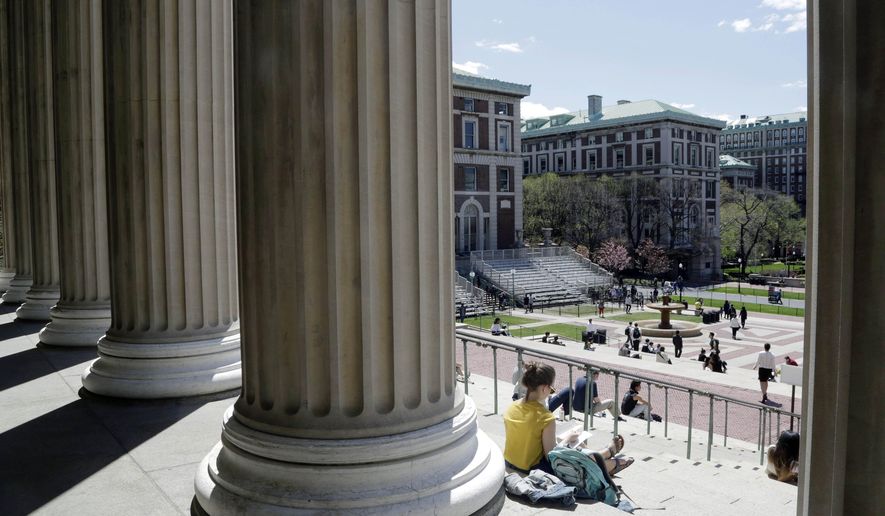A recent court ruling strikes out against anti-male bias in university tribunals for sexual assault cases, focusing attention on the due process rights of men accused of on-campus misconduct.
The U.S. Court of Appeals for the 2nd Circuit late last month enacted a new standard for handling motions to dismiss claims brought under Title IX — the federal statute banning sex discrimination in education.
The federal appeals court ruled that a district court improperly dismissed the case of “John Doe,” who said Columbia University violated federal and state anti-discrimination laws when it found him responsible for sexual assault. The appellate court vacated and remanded the lower court ruling for further proceedings.
The 2nd Circuit is the highest court to weigh in on the issue, and the ruling could prove influential even on other circuits, said K.C. Johnson, co-author of “Until Proven Innocent: Political Correctness and the Shameful Injustices of the Duke Lacrosse Rape Case.”
Mr. Johnson, who is also a history professor at Brooklyn College, said the decision allows students accused of sexual assault broader legal remedies against their universities.
“Accused students often have claimed that these new procedures violated [Title IX] in reverse — that effectively they were biased against male students,” he said in a written statement. “Most district courts have rejected these claims. The Appeals Court ruled that such claims can go forward, and offered a much broader grounds for accused students to ultimately prevail than lower courts have been using.”
In February 2014, Columbia found John Doe responsible for putting “unreasonable pressure for sexual activity” onto a female student, which “constituted coercion” so that subsequent “sexual intercourse was without consent.” He was suspended for one year and was not given credit for the classes in which he was enrolled at the time.
John Doe filed a lawsuit alleging several aspects of the investigation and the hearing into his case displayed a clear anti-male bias on the part of the university.
The university ignored evidence that the encounter was consensual, John Doe says, including his claim that the female student, identified as Jane Doe, initiated the encounter, chose its venue and retrieved a condom from her room. He says no evidence was presented to support the university’s conclusion that he coercively pressured the female student into having sex over a period of several weeks.
The student also alleges that Jilleian Sessions-Stackhouse did not act impartially in her capacity as Columbia’s Title IX investigator. John Doe said the investigator refused to interview witnesses who could have verified his interpretation of the encounter, ignored exculpatory evidence, willingly misconstrued his statements and routinely failed to inform him of his rights throughout the review process.
A Columbia spokesperson said the university does not comment on ongoing litigation.
Concurrent with the investigation into his case were internal and external calls for Columbia to provide additional protections for students who said they were sexually assaulted. The school had become a poster child in 2014 for its reticence in the face of allegations of sexual assault.
One article, written in an independent student newspaper in January 2014, specifically criticized Ms. Sessions-Stackhouse for conducting “inadequate investigation[s]” into allegations of sexual assault. Two months after John Doe was suspended, 23 Columbia students filed complaints with the U.S. Department of Education alleging the university mishandled their accusations of sexual assault.
In addition, a female student carried a 50-pound mattress with her everywhere on campus, including to her 2015 graduation ceremony, as a visual arts project after the university refused to expel a male student she had accused of raping her in 2012.
John Doe said that mounting pressure against the university played a role in the outcome of his case. Administrators, he said, were motivated to clear their own names rather than adjudicate the allegations against him impartially.
His case initially was dismissed by U.S. District Jesse Furman, who conceded that Columbia “may well have treated Jane Doe more favorably than [John Doe] during the disciplinary process,” but not necessarily due to his sex.
Judge Furman said the disparate treatment was “more plausibly” due to the university’s desire to avoid “negative publicity or Title IX liability” and “to treat complaints with a high degree of sensitivity.”
The 2nd Circuit rebuked Judge Furman’s reasoning, saying a “university that adopts, even temporarily, a policy of bias favoring one sex over the other in a disciplinary dispute, doing so in order to avoid liability or bad publicity, has practiced sex discrimination, notwithstanding that the motive for the discrimination did not come from ingrained or permanent bias against that particular sex.”
Mr. Johnson said the ruling does not guarantee the district court will side with John Doe. He said the 2nd Circuit ruling only clears one hurdle for complaints of discrimination brought under Title IX.
“But the facts of this particular case are very strong, and I’d say the accused student now has a good chance of getting the case to trial [if Columbia doesn’t settle],” Mr. Johnson said.
• Bradford Richardson can be reached at brichardson@washingtontimes.com.




Please read our comment policy before commenting.